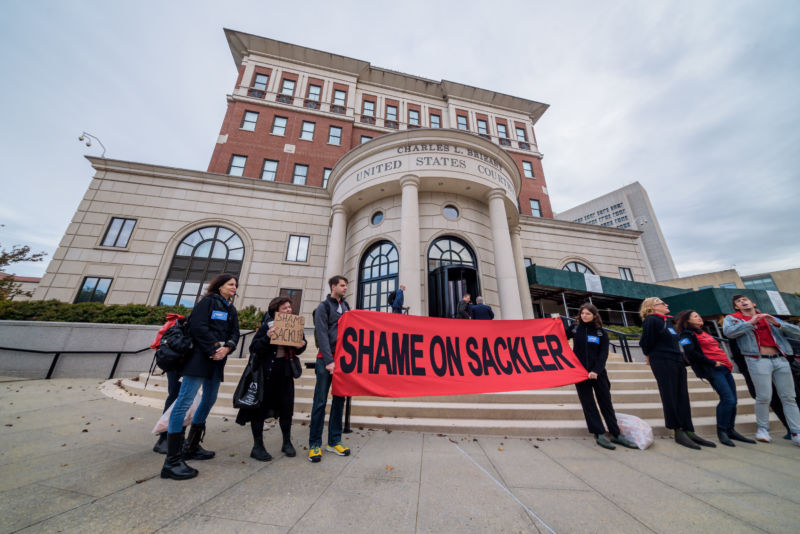
A federal bankruptcy judge on Wednesday extended “extraordinary” protections for the mega-rich Sackler family amid a call from legal experts for a special examiner to investigate the family’s finances and role in the opioid crisis.
The Sacklers own and control OxyContin-maker Purdue Pharma, which has largely been blamed for helping to spark the opioid crisis that now kills 130 people in the United States each day. The Sacklers and Purdue face around 2,000 lawsuits from states, cities, and municipalities, all alleging that they aggressively marketed their opioids and misled regulators, doctors, and patients about the drugs’ addictiveness.
Purdue filed for bankruptcy in September as part of a tentative settlement agreement with over 2,600 plaintiffs. But the Sacklers—who have an estimated worth of $13 billion— have not filed for bankruptcy. Moreover, state attorneys general have accused the family of quietly siphoning some of Purdue’s $35 billion from OxyContin sales into their own pockets and out of reach from litigation.
Nevertheless, Judge Robert Drain on Wednesday extended an injunction that shields the Sackler family from litigation, though such protections are typically only given to entities that have filed for bankruptcy. The original 180-day injunction that ended November 6 is now extended to April 8.
The Sacklers and Purdue argue that the pause in opioid litigation will keep them from using funds for legal fees rather than for paying victims of the crisis. To sweeten settlement talks, they’ve also offered to provide financial information with the plaintiffs and pledged that they won’t hide assets.
Slow and strained
But things haven’t been going smoothly so far. One attorney involved in the talks said progress with the Sacklers and Purdue has been “slow and strained,” according to The Washington Post.
As a potential solution, a group of legal scholars with expertise in bankruptcy proceedings has called upon the bankruptcy court to set up a special examiner to look into the Sacklers’ role in the opioid crisis. Specifically, the examiner could investigate what roles the Sacklers played in Purdue and what money the Sacklers may have transferred out of the company, which could go to litigation.
“This case presents unique challenges to the chapter 11 system which an examiner could better address than other alternatives,” the legal experts write in a letter to the court. A special examiner would be impartial and efficient and would provide critical answers in a case of such immense public interest.
The letter was signed by professors Jonathan Lipson of Temple University’s Beasley School of Law, Adam Levitin of Georgetown University Law Center, and Stephen Lubben of Seton Hall University School of Law.
They go on:
Even if all of the current plaintiffs in the underlying lawsuits agreed to put down their litigation arms and make peace with the Debtors [Purdue] and the Sacklers, we think there is another, equally important, reason for an examiner in these cases: the legitimacy of the chapter 11 process. We do not use “legitimacy” in a fancy way: we mean simply that there is intense public scrutiny of these cases given the severity of the opioid crisis, and serious concern about the propriety of the process, in particular that these cases may be used to shield the Sackler family and/or the Debtors from scrutiny in ways that many might find problematic. Neither settlement of the underlying lawsuits, nor any plan of reorganization, is likely to produce a publicly-available report that would allay these concerns. A bankruptcy examination can and should.
In a statement to The Wall Street Journal, Purdue Pharma responded to the letter saying that the “appointment of an examiner would be counterproductive and would harm Purdue’s ability to preserve value for the benefit of all stakeholders.”
https://arstechnica.com/?p=1598621

